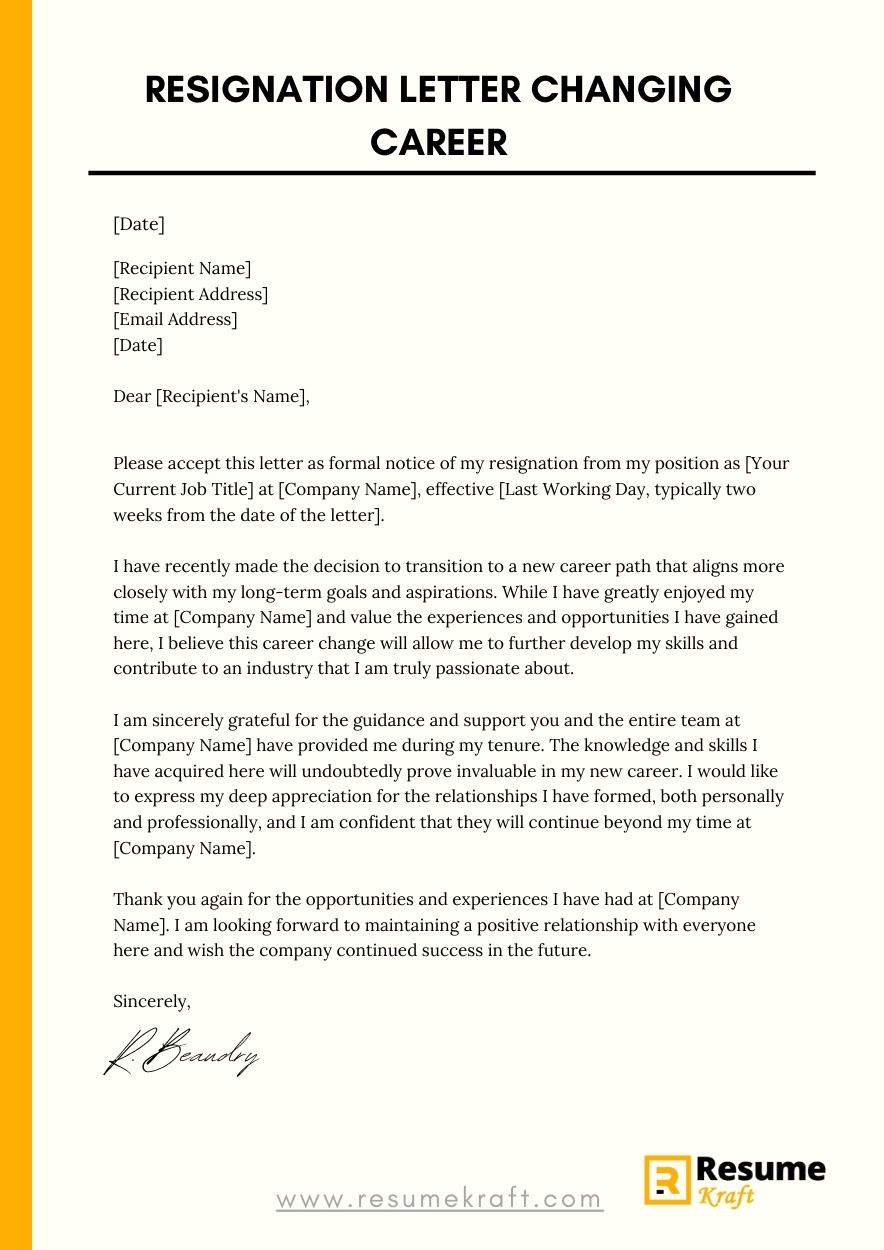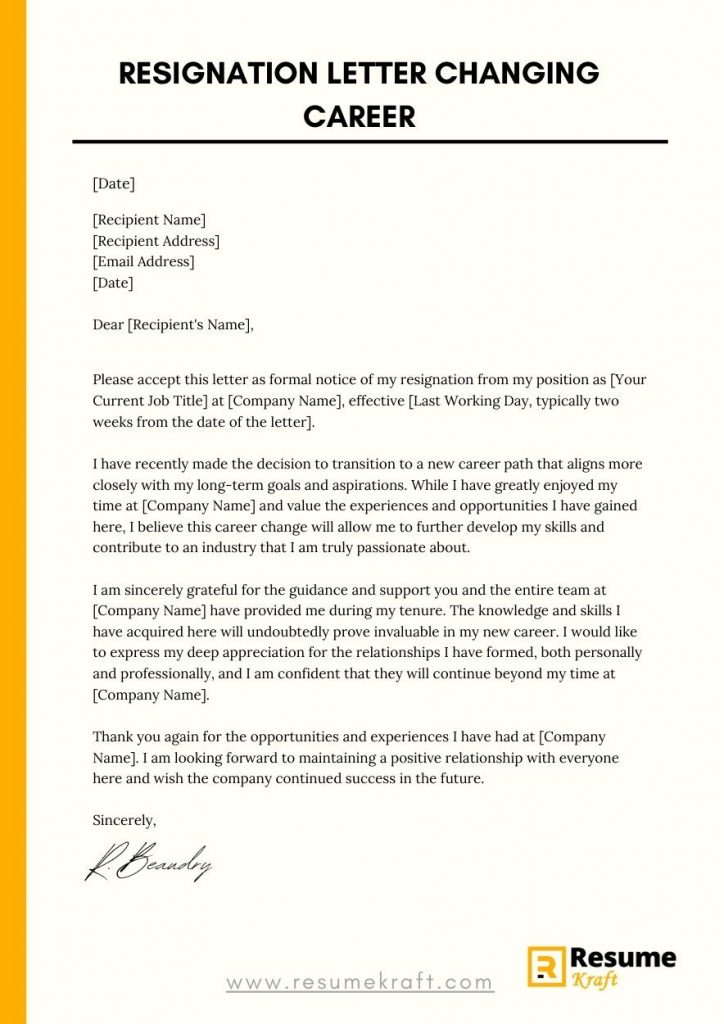
Are you considering a career change and need to write a resignation letter? Crafting a well-written resignation letter is an essential step in the process of transitioning to a new career. It allows you to leave your current position on a professional note while maintaining positive relationships with your coworkers and employer. In this article, we will guide you on how to write a resignation letter when changing careers and provide you with some real-person samples to help you get started.
- What To Include in a Resignation Letter When Changing Careers
- What Not to Include in Your Resignation Letter When Changing Careers
- How To Format a Resignation Letter When Changing Careers
- Resignation Letter Sample
- Resignation Letter When Changing Careers – Sample 1: Printed Resignation Letter
- Resignation Letter When Changing Careers – Sample 2: Email Resignation Letter
- Key Takeaways
- Frequently Asked Questions
- Conclusion
What To Include in a Resignation Letter When Changing Careers
When writing a resignation letter for a career change, it is important to include the following components:
1. Your Contact Information
Begin your resignation letter by including your full name, current job title, and contact information. This helps ensure that your employer can easily reach out to you if needed.
2. Date of Resignation
Clearly state the date when your resignation will become effective. This allows your employer to plan for your departure and start the transition process.
3. Reason for Resignation
Briefly explain your reason for resigning, focusing on your career change. You may mention the new opportunities that await you or the specific industry or job you will be pursuing.
4. Gratitude and Appreciation
Express your gratitude for the opportunities and experiences you have had with the company. Highlight the skills and knowledge you have gained during your tenure and mention any mentors or colleagues who have made a positive impact on your career.
5. Offer Assistance in Transition
Offer your assistance in making a smooth transition for your successor. This could include training, providing documentation, or being available for questions during the transition period.
6. Closing and Signature
End your resignation letter with a professional closing, such as “Sincerely” or “Best regards,” followed by your signature and printed name.
What Not to Include in Your Resignation Letter When Changing Careers
While it’s important to include certain elements in your resignation letter, there are a few things you should avoid:
1. Negative Comments or Criticisms
Refrain from including any negative comments or criticisms about your current employer, coworkers, or the company itself. Maintain a positive and professional tone throughout your resignation letter.
2. Detailed Reasons for Leaving
While you should mention your career change as the reason for your resignation, you don’t need to provide extensive details. Keep it concise and focus on the future rather than dwelling on any negative aspects of your current position.
3. Demands or Ultimatums
Avoid making demands or presenting ultimatums in your resignation letter. It is a courteous gesture to offer assistance during the transition, but it should not be presented as a condition for your resignation.
How To Format a Resignation Letter When Changing Careers
Formatting your resignation letter is important to ensure it looks professional and is easy to read. Follow these guidelines for an effective format:
1. Use a Formal Tone
Maintain a formal and professional tone throughout your resignation letter. Remember, this is a formal communication with your employer, and being respectful is essential.
2. Use a Professional Font and Formatting
Choose a professional font such as Arial, Times New Roman, or Calibri, in a 12-point size. Use standard margins and align your text to the left. This makes your letter easy to read and visually appealing.
3. Keep it Concise
Resignation letters should be concise and to the point. Aim for a length of no more than one page, using clear and concise language. Avoid unnecessary details and rambling.
4. Proofread for Errors
Thoroughly proofread your resignation letter for any grammar or spelling mistakes before sending it. Mistakes can reflect poorly on your professionalism and attention to detail.
Resignation Letter Sample

Resignation Letter When Changing Careers – Sample 1: Printed Resignation Letter
[Your Name]
[Your Address]
[City, State, Zip Code]
[Email Address]
[Phone Number]
[Date]
[Recipient’s Name]
[Recipient’s Position]
[Company Name]
[Company Address]
[City, State, Zip Code]
Dear [Recipient’s Name],
Please accept this letter as formal notice of my resignation from my position as [Your Current Job Title] at [Company Name], effective [Last Working Day, typically two weeks from the date of the letter].
I have recently made the decision to transition to a new career path that aligns more closely with my long-term goals and aspirations. While I have greatly enjoyed my time at [Company Name] and value the experiences and opportunities I have gained here, I believe this career change will allow me to further develop my skills and contribute to an industry that I am truly passionate about.
I am sincerely grateful for the guidance and support you and the entire team at [Company Name] have provided me during my tenure. The knowledge and skills I have acquired here will undoubtedly prove invaluable in my new career. I would like to express my deep appreciation for the relationships I have formed, both personally and professionally, and I am confident that they will continue beyond my time at [Company Name].
As I transition out of my role, I am committed to ensuring a smooth handover process. I am more than willing to provide support to my colleagues and assist in the training of my replacement to ensure a seamless transition. Please do not hesitate to reach out to me for any assistance during this period.
Thank you again for the opportunities and experiences I have had at [Company Name]. I am looking forward to maintaining a positive relationship with everyone here and wish the company continued success in the future.
Sincerely,
[Your Name]
Resignation Letter When Changing Careers – Sample 2: Email Resignation Letter
Subject: [Your Name] – Resignation Letter
Dear [Recipient’s Name],
I hope this email finds you well. I am writing to formally resign from my position as [Your Current Job Title] at [Company Name], effective [Last Working Day, typically two weeks from the date of the email].
After careful consideration, I have made the decision to embark on a career change that will allow me to pursue my passion for [New Career Path]. While I have enjoyed working at [Company Name] and have learned a great deal during my time here, I believe this career change will offer new and exciting opportunities for growth and development.
I want to express my sincere gratitude for all the support and guidance I have received throughout my tenure at [Company Name]. The experiences and skills I have gained have been invaluable, and I am truly appreciative of the opportunities provided to me. I have had the pleasure of working with exceptional colleagues and mentors, and I hope to maintain these relationships moving forward.
During my notice period, I am fully committed to completing any pending projects and ensuring a smooth transition for my successor. I am available to assist with any necessary handover documentation or provide training to ensure a seamless transition.
Once again, I want to express my gratitude for the opportunities I have had at [Company Name]. I wish the company continued success in the future, and I look forward to staying connected with everyone.
Thank you for your understanding and support.
Best regards,
[Your Name]
Key Takeaways
Writing a resignation letter when changing careers is a significant step in leaving your current position on a professional note. Remember the following key points:
- Include your contact information, the date of your resignation, the reason for leaving, expressions of gratitude, and an offer of assistance in your resignation letter.
- Avoid negative comments, detailed reasons for leaving, and demands or ultimatums in your resignation letter.
- Use a formal tone, professional font and formatting, and keep your letter concise.
- Proofread your resignation letter for errors before sending it.
With these guidelines and real-person sample letters, you can navigate the process of writing your resignation letter when changing careers with confidence.
Frequently Asked Questions
1. How much notice should I give when resigning to change careers?
When resigning to change careers, it is generally recommended to provide a notice period of two weeks. However, if you have a contractual obligation or if your role requires a longer transition period, you may need to give more notice.
2. Should I mention my new career path in my resignation letter?
Yes, it is appropriate to mention your new career path briefly in your resignation letter. However, keep your focus on expressing gratitude and maintaining professionalism throughout the letter.
3. Can I use a resignation letter template for my career change resignation?
While resignation letter templates can serve as a helpful guide, it is important to personalize your letter and tailor it to your specific situation. Templates can provide structure and ideas but should not be copied word for word.
4. How do I address my resignation letter?
Address your resignation letter to your immediate supervisor or manager. If necessary, you can also include additional recipients such as the HR department or relevant team members.
5. Can I resign verbally or do I need to provide a written resignation letter?
While it may be appropriate to have a verbal conversation about your resignation with your supervisor, it is always recommended to provide a written resignation letter as a formal record of your intent to resign. This helps ensure clarity and avoids any miscommunication.
Conclusion
Writing a resignation letter when changing careers is an important part of the transition process. By including key components, maintaining a professional tone, and following proper formatting, you can ensure that your resignation letter is effective and leaves a positive impression as you embark on your new career path. Remember to personalize your letter and express gratitude for the opportunities and experiences gained in your current role. Best of luck with your career change!

